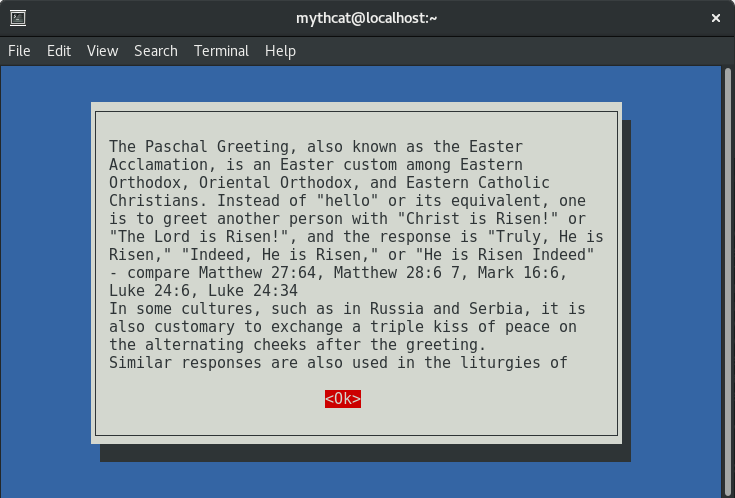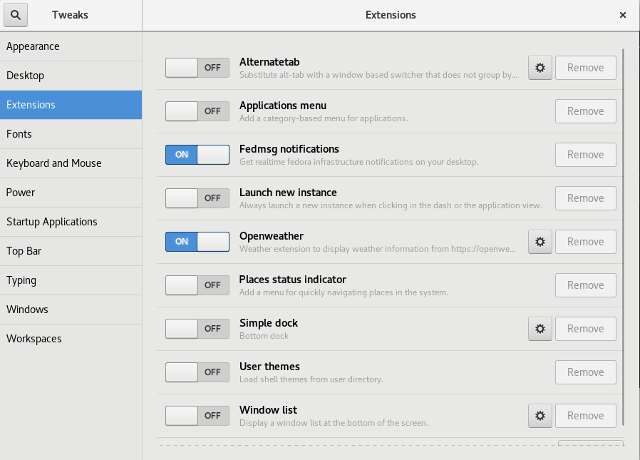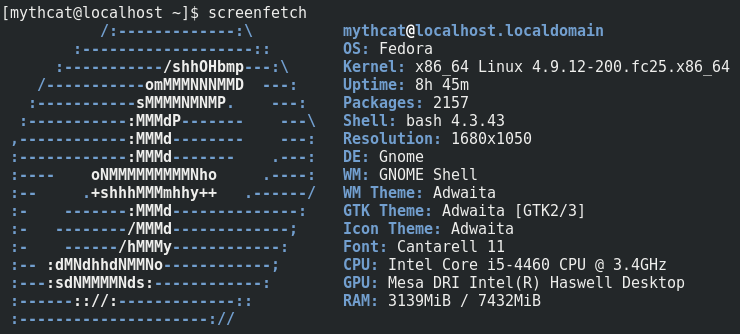The ClamTk is a graphical front-end for ClamAV using Perl and Gtk libraries.

[root@localhost mythcat]# dnf search clamtk
Last metadata expiration check: 1:24:49 ago on Tue Apr 18 17:01:00 2017.
============================= N/S Matched: clamtk ==============================
clamtk.noarch : Easy to use graphical user interface for Clam anti virus[root@localhost mythcat]# dnf install clamtk.noarch
Last metadata expiration check: 1:31:00 ago on Tue Apr 18 17:01:00 2017.
Dependencies resolved.
================================================================================
Package Arch Version Repository Size
================================================================================
Installing:
clamtk noarch 5.24-1.fc25 updates 218 k
perl-Cairo x86_64 1.106-3.fc25 fedora 125 k
perl-File-Listing noarch 6.04-13.fc25 fedora 17 k
perl-Glib x86_64 1.321-2.fc25 fedora 364 k
perl-Gtk2 x86_64 1.2498-3.fc25 fedora 1.8 M
perl-HTTP-Cookies noarch 6.01-13.fc25 fedora 29 k
perl-HTTP-Negotiate noarch 6.01-13.fc25 fedora 21 k
perl-JSON noarch 2.90-7.fc25 fedora 98 k
perl-LWP-Protocol-https noarch 6.07-1.fc25 updates 16 k
perl-Locale-gettext x86_64 1.07-4.fc25 fedora 26 k
perl-NTLM noarch 1.09-13.fc25 fedora 23 k
perl-Net-HTTP noarch 6.13-1.fc25 updates 41 k
perl-Pango x86_64 1.227-3.fc25 fedora 190 k
perl-Test-Simple noarch 1.302062-1.fc25 fedora 410 k
perl-Text-CSV noarch 1.91-4.fc25 updates 103 k
perl-Time-Piece x86_64 1.31-385.fc25 updates 88 k
perl-WWW-RobotRules noarch 6.02-14.fc25 fedora 22 k
perl-libwww-perl noarch 6.15-3.fc25 fedora 208 k
Transaction Summary
================================================================================
Install 18 Packages
Total download size: 3.7 M
Installed size: 10 M
Is this ok [y/N]: y
Downloading Packages:
(1/18): clamtk-5.24-1.fc25.noarch.rpm 517 kB/s | 218 kB 00:00
(2/18): perl-Glib-1.321-2.fc25.x86_64.rpm 662 kB/s | 364 kB 00:00
(3/18): perl-Locale-gettext-1.07-4.fc25.x86_64. 296 kB/s | 26 kB 00:00
(4/18): perl-Gtk2-1.2498-3.fc25.x86_64.rpm 2.3 MB/s | 1.8 MB 00:00
(5/18): perl-libwww-perl-6.15-3.fc25.noarch.rpm 1.4 MB/s | 208 kB 00:00
(6/18): perl-JSON-2.90-7.fc25.noarch.rpm 181 kB/s | 98 kB 00:00
(7/18): perl-Cairo-1.106-3.fc25.x86_64.rpm 439 kB/s | 125 kB 00:00
(8/18): perl-Pango-1.227-3.fc25.x86_64.rpm 1.7 MB/s | 190 kB 00:00
(9/18): perl-File-Listing-6.04-13.fc25.noarch.r 204 kB/s | 17 kB 00:00
(10/18): perl-HTTP-Cookies-6.01-13.fc25.noarch. 375 kB/s | 29 kB 00:00
(11/18): perl-HTTP-Negotiate-6.01-13.fc25.noarc 250 kB/s | 21 kB 00:00
(12/18): perl-Test-Simple-1.302062-1.fc25.noarc 1.5 MB/s | 410 kB 00:00
(13/18): perl-NTLM-1.09-13.fc25.noarch.rpm 160 kB/s | 23 kB 00:00
(14/18): perl-WWW-RobotRules-6.02-14.fc25.noarc 168 kB/s | 22 kB 00:00
(15/18): perl-Net-HTTP-6.13-1.fc25.noarch.rpm 315 kB/s | 41 kB 00:00
(16/18): perl-Time-Piece-1.31-385.fc25.x86_64.r 638 kB/s | 88 kB 00:00
(17/18): perl-LWP-Protocol-https-6.07-1.fc25.no 77 kB/s | 16 kB 00:00
(18/18): perl-Text-CSV-1.91-4.fc25.noarch.rpm 297 kB/s | 103 kB 00:00
--------------------------------------------------------------------------------
Total 1.3 MB/s | 3.7 MB 00:02
Running transaction check
Transaction check succeeded.
Running transaction test
Transaction test succeeded.
Running transaction
Installing : perl-Glib-1.321-2.fc25.x86_64 1/18
Installing : perl-Net-HTTP-6.13-1.fc25.noarch 2/18
Installing : perl-Cairo-1.106-3.fc25.x86_64 3/18
Installing : perl-Pango-1.227-3.fc25.x86_64 4/18
Installing : perl-Time-Piece-1.31-385.fc25.x86_64 5/18
Installing : perl-Text-CSV-1.91-4.fc25.noarch 6/18
Installing : perl-WWW-RobotRules-6.02-14.fc25.noarch 7/18
Installing : perl-NTLM-1.09-13.fc25.noarch 8/18
Installing : perl-HTTP-Negotiate-6.01-13.fc25.noarch 9/18
Installing : perl-HTTP-Cookies-6.01-13.fc25.noarch 10/18
Installing : perl-File-Listing-6.04-13.fc25.noarch 11/18
Installing : perl-libwww-perl-6.15-3.fc25.noarch 12/18
Installing : perl-LWP-Protocol-https-6.07-1.fc25.noarch 13/18
Installing : perl-Test-Simple-1.302062-1.fc25.noarch 14/18
Installing : perl-Gtk2-1.2498-3.fc25.x86_64 15/18
Installing : perl-Locale-gettext-1.07-4.fc25.x86_64 16/18
Installing : perl-JSON-2.90-7.fc25.noarch 17/18
Installing : clamtk-5.24-1.fc25.noarch 18/18
Verifying : clamtk-5.24-1.fc25.noarch 1/18
Verifying : perl-Glib-1.321-2.fc25.x86_64 2/18
Verifying : perl-Gtk2-1.2498-3.fc25.x86_64 3/18
Verifying : perl-JSON-2.90-7.fc25.noarch 4/18
Verifying : perl-Locale-gettext-1.07-4.fc25.x86_64 5/18
Verifying : perl-libwww-perl-6.15-3.fc25.noarch 6/18
Verifying : perl-Cairo-1.106-3.fc25.x86_64 7/18
Verifying : perl-Pango-1.227-3.fc25.x86_64 8/18
Verifying : perl-Test-Simple-1.302062-1.fc25.noarch 9/18
Verifying : perl-File-Listing-6.04-13.fc25.noarch 10/18
Verifying : perl-HTTP-Cookies-6.01-13.fc25.noarch 11/18
Verifying : perl-HTTP-Negotiate-6.01-13.fc25.noarch 12/18
Verifying : perl-NTLM-1.09-13.fc25.noarch 13/18
Verifying : perl-WWW-RobotRules-6.02-14.fc25.noarch 14/18
Verifying : perl-Net-HTTP-6.13-1.fc25.noarch 15/18
Verifying : perl-LWP-Protocol-https-6.07-1.fc25.noarch 16/18
Verifying : perl-Text-CSV-1.91-4.fc25.noarch 17/18
Verifying : perl-Time-Piece-1.31-385.fc25.x86_64 18/18
Installed:
clamtk.noarch 5.24-1.fc25
perl-Cairo.x86_64 1.106-3.fc25
perl-File-Listing.noarch 6.04-13.fc25
perl-Glib.x86_64 1.321-2.fc25
perl-Gtk2.x86_64 1.2498-3.fc25
perl-HTTP-Cookies.noarch 6.01-13.fc25
perl-HTTP-Negotiate.noarch 6.01-13.fc25
perl-JSON.noarch 2.90-7.fc25
perl-LWP-Protocol-https.noarch 6.07-1.fc25
perl-Locale-gettext.x86_64 1.07-4.fc25
perl-NTLM.noarch 1.09-13.fc25
perl-Net-HTTP.noarch 6.13-1.fc25
perl-Pango.x86_64 1.227-3.fc25
perl-Test-Simple.noarch 1.302062-1.fc25
perl-Text-CSV.noarch 1.91-4.fc25
perl-Time-Piece.x86_64 1.31-385.fc25
perl-WWW-RobotRules.noarch 6.02-14.fc25
perl-libwww-perl.noarch 6.15-3.fc25
Complete!The first step when opening ClamTK GUI is to select "Update Assistant".
You can choose "I would like to update signatures myself".
You should go back to the home screen of ClamTK and click "Settings"
Also, you can use this GUI to scan, update and analysis your operating system.


